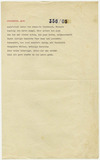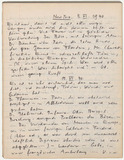Bertolt Brecht: Work diary, 1938-1942 (1973)
Bertolt Brecht: Work diary, 1938-1942 (1973)
die emigration schläft, aber unruhig. da sind einige alpdrücke, daß hitler das kleingeld doch nicht ausgeht, daß der falsche papst gewählt wird, daß churchill schlappmachen könnte. das pferdchen, auf das man am liebsten setzt, der favorit, ist die „friedenssehnsucht des deutschen volkes“
[the emigrants are sleeping, but uneasily. there are the little nightmares, that hitler's not losing steam after all, that the wrong pope will be elected, that churchill might lose his nerve. but the horse one most wants to put his money on, the favourite, is “the desire for peace of the german people” (ed. trans.)]
Bertolt Brecht in his work journal on 19 February 1939
The writer Bertolt Brecht was a tireless diarist. In addition to his private diaries, he also kept a work diary, which his wife Helene Weigel later designated his Arbeitsjournal [work diary]. He used this to collect materials. He noted play projects, responses to his reading materials and commented on the political events of the day. He supplemented his entries with photographs and newspaper cuttings. He also recorded his memories of conversations with colleagues, some of whom also lived in exile: words of praise for his friend, the writer Lion Feuchtwanger or cutting remarks on the writer Thomas Mann, with whom Brecht did not get along.
Brecht also used his work diary to record the extent to which his exile impaired his writing work. For example he noted how he had begun work on his play Der gute Mensch von Sezuan [The Good Person of Szechwan], but had been unable to continue it in Denmark and Sweden and was hoping for better working conditions in Finland.
His work diary remained unpublished for a long time. Helene Weigel delayed its publication because she believed that it contained too much criticism of living persons. It was published in 1973 by the Suhrkamp and Aufbau publishing houses.




